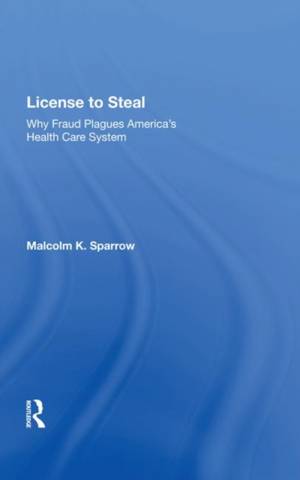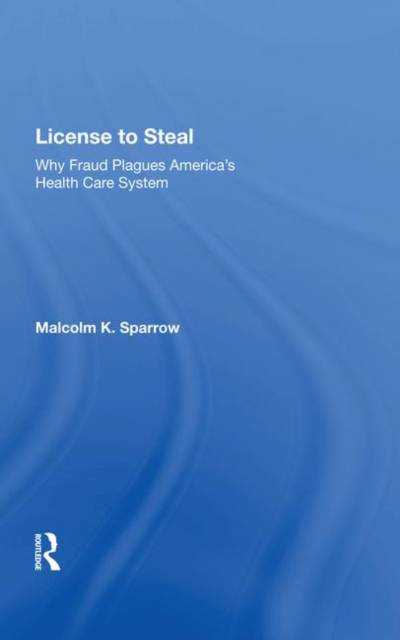
Door een staking bij bpost kan je online bestelling op dit moment iets langer onderweg zijn dan voorzien. Dringend iets nodig? Onze winkels ontvangen jou met open armen!
- Afhalen na 1 uur in een winkel met voorraad
- Gratis thuislevering in België vanaf € 30
- Ruim aanbod met 7 miljoen producten
Door een staking bij bpost kan je online bestelling op dit moment iets langer onderweg zijn dan voorzien. Dringend iets nodig? Onze winkels ontvangen jou met open armen!
- Afhalen na 1 uur in een winkel met voorraad
- Gratis thuislevering in België vanaf € 30
- Ruim aanbod met 7 miljoen producten
Zoeken
License to Steal
How Fraud Bleeds America's Health Care System, Updated Edition
Malcolm K Sparrow
Hardcover | Engels
€ 182,45
+ 364 punten
Uitvoering
Omschrijving
Criminal fraud must be factored into the current debates about health care reform, budget deficits, and proposed Medicare/Medicaid cutbacks. As a polity, how can we make good public policy if we don't know how much of the nation's one trillion dollar health care budget is being lost to fraud? The amounts are staggering, measured in hundreds of billions of dollars, but nobody knows for sure exactly how much is being lost. Malcolm Sparrow, an expert on fraud control, reviews how the health care industry approaches the problem and concludes that fraud is rampant, largely uncontrolled, and mostly invisible to policymakers. The problem will only get worse, he says, unless the industry at all levels changes its priorities, its strategies for uncovering and preventing fraud, and its technological approach. Many believe that electronic claims processing will save billions of dollars and that managed care will eliminate the major categories of fraud. By contrast, Sparrow shows how electronic claims processing could lead to unprecedented fraud losses, and how managed care makes fraud much more dangerous to human health. The final section-prescriptions for progress-is a must for policymakers at every level, and for anyone with an interest in the science of fraud control more broadly, in any context.
Specificaties
Betrokkenen
- Auteur(s):
- Uitgeverij:
Inhoud
- Aantal bladzijden:
- 256
- Taal:
- Engels
Eigenschappen
- Productcode (EAN):
- 9780367009717
- Verschijningsdatum:
- 7/06/2019
- Uitvoering:
- Hardcover
- Formaat:
- Genaaid
- Afmetingen:
- 156 mm x 233 mm
- Gewicht:
- 452 g

Alleen bij Standaard Boekhandel
+ 364 punten op je klantenkaart van Standaard Boekhandel
Beoordelingen
We publiceren alleen reviews die voldoen aan de voorwaarden voor reviews. Bekijk onze voorwaarden voor reviews.











